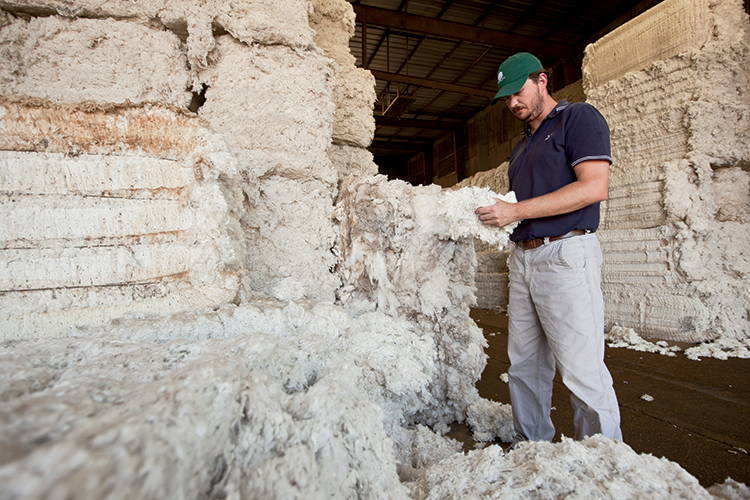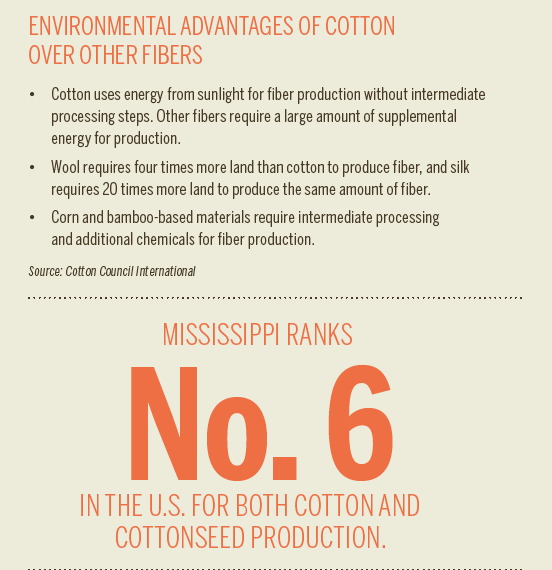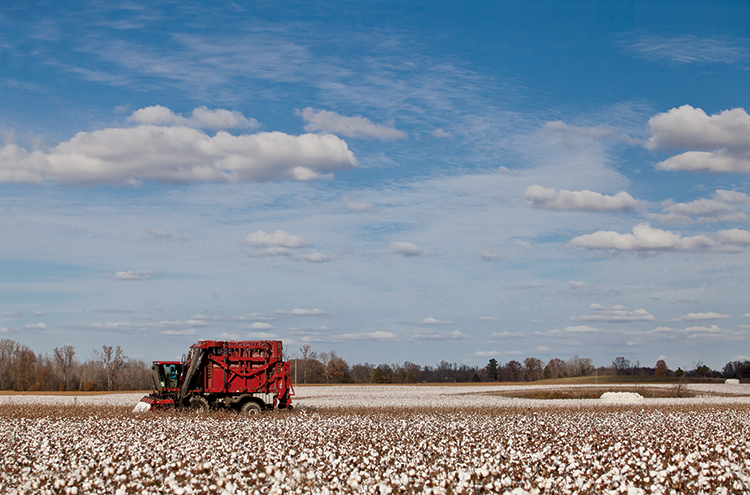Home > Mississippi > Mississippi Environment > Cotton Conservation Kings
Cotton Conservation Kings
In partnership with: Mississippi Department of Agriculture and Commerce
 When fourth-generation cotton farmer Lawson Gary talks about the future of the cotton industry in Mississippi, you can hear the excitement in his voice. And for good reason. Gary’s company, TJ Beall, developed the True Cotton method of cleaning cotton without scouring or bleaching, which he says will help make cotton more competitive with synthetic materials.
When fourth-generation cotton farmer Lawson Gary talks about the future of the cotton industry in Mississippi, you can hear the excitement in his voice. And for good reason. Gary’s company, TJ Beall, developed the True Cotton method of cleaning cotton without scouring or bleaching, which he says will help make cotton more competitive with synthetic materials.
Good Stewards
“Because of the inputs involved, bleached cotton is one of the most expensive staples fibers available for the nonwovens industry,” says Gary, the company’s chief operating officer. “Our much-reduced inputs and processes allow us to finally price cotton at a level that is competitive with the thermoplastic polymers that most all disposable consumer products are made out of.” Gary says the disposable products market – diapers, baby wipes, adult incontinence products and feminine hygiene products – is growing and offers major opportunities for the company’s unfinished cotton. But the company’s bottom line is not the only beneficiary of the true cotton process; the environment reaps big rewards, too. “We mechanically process cotton. We only use electricity. We don’t use water, so there are huge water savings and zero manufacturing effluents. We don’t use chemicals, and we don’t have to dry the bulk fiber, which is where the cost comes in when making cotton white and absorbent,” Gary says. In 2014, the method earned the company the prestigious INDEX 14 award for sustainable process or management practice at EDANA’s annual global exhibition. EDANA is the international association for nonwovens and related industries, and the INDEX 14 award is billed as the industry’s highest accolade for excellence and innovation. TJ Beall’s resource-reducing cleaning method is just one example of the sustainable processes and innovations being implemented by Mississippi’s cotton growers.
Water Management
Dr. Kater Hake, vice president of Agricultural & Environmental Research for Cotton Incorporated, says water and soil are the most important resources for cotton farmers in Mississippi’s sundrenched Delta. Growers have been implementing irrigation techniques and tools, such as pivot irrigation and the Pipe Hole and Universal Crown Evaluation Tool, or PHAUCET, water management program, to help maximize efficient use of this precious commodity. “Both of those water management tools also minimize the amount of irrigation water that leaves the field, and that’s important for reducing the amount of fertilizer that runs off the field,” Hake says. “We have problems with fertilizer flowing down the Mississippi River into the Gulf area. Delta growers are trying to minimize that by careful irrigation.”
Nutrient Management
Hake says more of the state’s cotton growers have adopted conservation tilling practices, including reduced tillage and no-till, which has the most dramatic impact on minimizing the amount of fertilizer that leaves the field through runoff. “Conservation tillage keeps the soil in place in a field,” Hake says. “You’ve got the organic matter on the surface, then you have cover crops and residue, and all that protects the surface soil, which has the highest amount of fertilizer, from washing away.” 
Economic Impact
Sustainable practices within the cotton industry have a ripple effect across the state’s economy. Gary says cotton has the largest economic multiplier of any other crop in the state. He says increased efficiencies coupled with a growing consumer demand will mean more revenue for farmers and more growth for local economies. “Anything a grower does to make his operations more efficient – whether it’s in regards to water, pesticides, fertilizers or energy – those have a dramatic effect on his profitability and the sustainability of his operation,” Hake says. But more so, he says, “Cotton in general has a very positive impact on jobs in a community – jobs like consultants. The cotton industry relies heavily on consultants to advise growers. Also, there are jobs in crop management, and the processing of cotton requires a whole other set of workers.” Both Gary and Hake point to the relationship between the cotton industry and consumers as having a significant impact on conservation efforts. “Cotton is a crop that’s desired by consumers, and cotton growers are fortunate to have that relationship with the consumer,” Hake says. “The whole concept of environmental stewardship, sustainability and traceability is important to consumers, and the cotton industry has responded accordingly, as evidenced by the sustainable practices of Lawson Gary and TJ Beall.”




